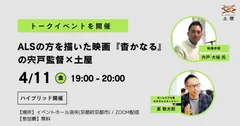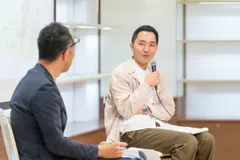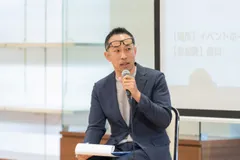Tsuchiya Corporation: "No Knowledge", a film about people with ALS Talk Event with Director Shishido
株式会社土屋
Tsuchiya Corporation (Head office: Ibara City, Okayama Prefecture; Representative Director: Toshiyuki Takahama; Number of employees: 2,646), a social business company that provides home-visit care services for people with severe disabilities nationwide, as well as day care services, regular patrols, and home nursing services for the elderly, held a talk event in Kyoto on April 11, 2025, in connection with a film about a person with ALS. The event was held in Kyoto City, Japan, and featured the director of the film, Shishido, who depicted a person with ALS.
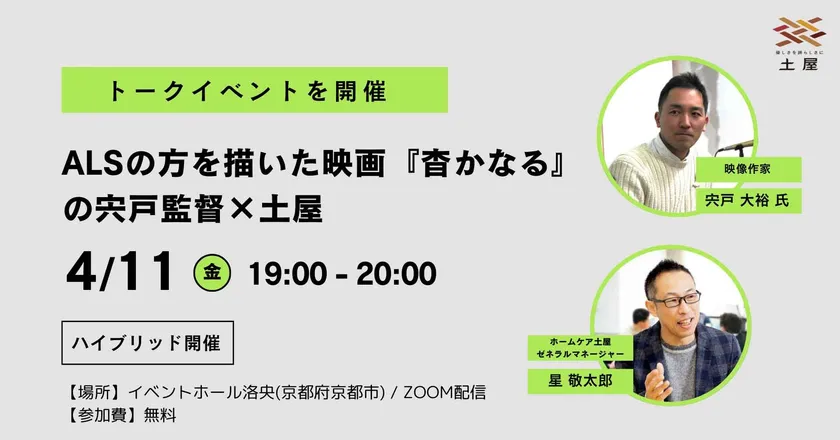
Talk Event with Director Shishido and Tsuchiya Co.
Ltd. planned this event to coincide with the release date of the film in Kyoto in the hope that more people would learn about the existence of home-visit nursing care for the elderly and the daily lives of people living with incurable diseases, as well as to share the thoughts and feelings Director Shishido gained through his interactions with various people through the film "nookanaru". The event was held in conjunction with the film's release date in Kyoto, and was attended by a large number of participants, including Keitaro Hoshi, General Manager of Home Care Tsuchiya.
■Outline of the event
Title : Director Shishido and Tsuchiya of "No Knowledge", a film about people with ALS
Date : April 11, 2025
Speakers : Daihiro Shishido (Filmmaker)
Keitaro Hoshi (General Manager, Home Care Tsuchiya)
Sponsor : Tsuchiya Corporation
Venue : Event Hall Rakuho
Format : Hybrid of on-site and online
Participants: 40 at the venue, 384 online
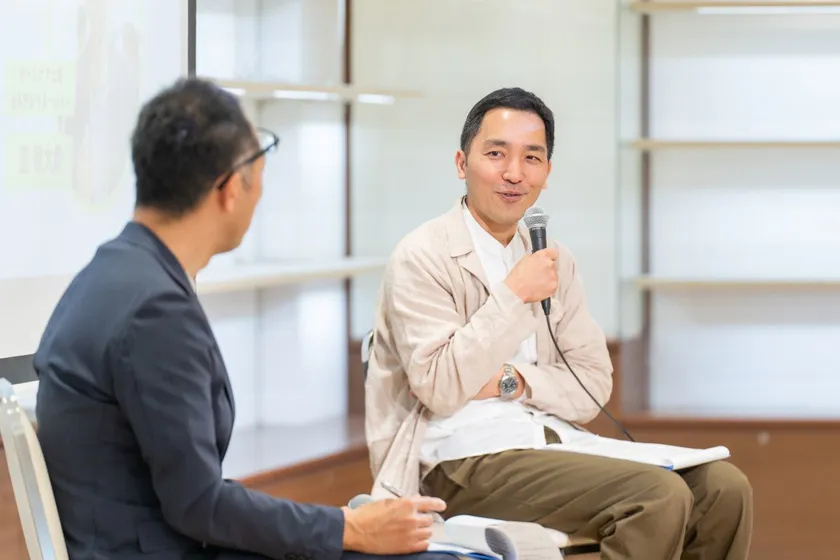
Director Shishido (right) in conversation with Keitaro Hoshi
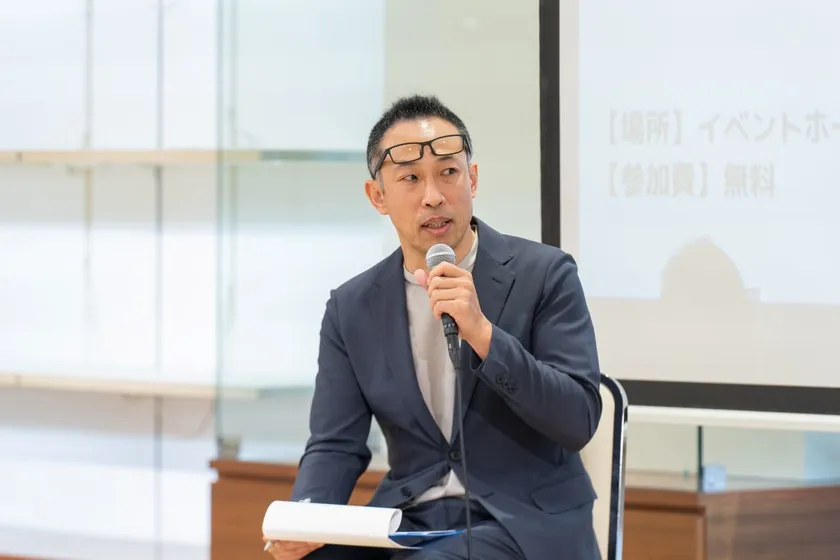
Dialogue with Keitaro Hoshi
Director Daihiro Shishido's Career
Born in Miyagi Prefecture in 1982. As a student, he produced the documentary film "Mt. Takao: 24 Years of Memories" (2008), which depicted the development of a tunnel to Mt. Takao, a mountain rich in nature in Tokyo, and the local people who opposed it.
His previous works include "Kaze wa Ikiteyo to Sono" about a person living in the community while using a ventilator, "Hyakuha no Shiori Sayamaen no Hibi" about life at a residential facility for people with intellectual disabilities, and "Michikusa" about the daily life of a young man with autism and intellectual disabilities who lives with his caregivers in the community.
■About the film "No Knowing".
This is a documentary film that records the progress of people affected by ALS (amyotrophic lateral sclerosis), an intractable disease that causes gradual loss of muscle movement throughout the body.
Outline of the day's event
<I don't want to make a film about a person with ALS, I want to make a film about the way of life of a person.
Director Shishido says that he was inspired to make "No Knowing" by the shock of the commissioned murder of an ALS patient in Kyoto, Japan, which occurred in 2019. He was appalled by the "negative words" and "the way society looked at him" that abounded on the Internet.
At the same time, she was appalled at the way society treats "living" as a "personal problem" and lumps all people together under the name of "self-responsibility," and at the values that judge people by their "productivity. The film is aimed at people who are suffering and isolated in such a society. "I want to make a film that will make people think about what will make them raise their downcast faces," he began filming.
I want to make a film for people who are isolated and lonely, and there are a lot of people in the world, but I want to bring this film to one person. I have made this film with the idea of making a film that can be delivered to one person who is somewhere in the world, who is depressed.
In this interview, Keitaro Hoshi, General Manager of Homecare Tsuchiya, and I had a heated discussion about "living" and the meaning of life that people with disabilities are constantly confronted with. The talk was a heated one with Keitaro Hoshi, General Manager of HomeCare Tsuchiya.
Director Shishido was deeply impressed by the wordless communication between ALS patients and helpers, while Hoshi, who has 20 years of experience in nursing care, spoke of the dedicated care given by the helpers engaged in severe home-visit care, saying, "(ALS patients) keep what they think and think until the very end. I would like to take this opportunity to tell many people about it. I would like to take this opportunity to share this with as many people as possible.
During the Q&A session, many sincere questions were asked about the specific system of the long-term care system, the issue of disparities between regions, the rate of ventilator use among ALS patients, and the issue of euthanasia, as if the flow of the talk event had been directly carried over. Director Shishido also spoke about the reality that "palliative care is too late for people with intractable diseases" in relation to the issue of euthanasia, giving us a glimpse of the film "No Knowing" and making us rethink the meaning of "life". The event was a reminder of what it means to live.
Keitaro Hoshi, General Manager (now Supervisor), Home Care Tsuchiya Co.
The movie "No Knowing" and this dialogue gave me an opportunity to rethink about the meaning of life.
Currently, about 10% of ALS patients are considered to have TLS (Total Locked Syndrome), in which even the movement of the eyeballs is locked, making communication difficult. Even for those who are in such a state that makes one wonder if they are still able to think, they are still able to think and think, and communication remains important to them until the very end.
When I saw the film, I felt that director Shishido was trying to convey this message, and I felt deep empathy when he talked about "self-responsibility" in relation to the commissioned murder of an ALS patient in Kyoto.
In today's society, people's existence seems to be measured in terms of productivity and efficiency, but I think it would be good to have a viewpoint that unconditionally respects the existence of any person, no matter who they are or what their condition is. I think it would be good to have such a viewpoint.
Each of us has our own "yardsticks" such as efficiency and productivity, but these are only a partial measure of what is necessary for life. I question the fact that each of us judges others based on such partial "yardsticks," and I am sure that there must be some "yardsticks" that we do not have and that we do not know about.
If it is a "measure" of efficiency, a normal person may be better than a person with a severe disability, but if it is a "measure" of listening to a person's problems, a person with a severe disability may be better than a person with a severe disability. However, when it comes to listening to the concerns of others, the severely disabled may be superior.
Through "No Knowing", I was reminded that "being alive is never meaningless", and I strongly felt that it would be better to abandon "materialism" and unconditionally respect the fact that one is alive. I strongly felt that it would be better to abandon the "yardstick" itself and unconditionally respect the fact that we are alive.
The "suffering of living" that can occur in such a situation is something that we caregivers must resolve by improving the care environment and reducing the burden of care for the family members.
However, in the dialogue, Director Shishido introduced the experience of one of the parties involved, saying, "I made a promise a little further down the road with a patient who was unsure about wearing a ventilator, and dreamed of fun things, and before I knew it, people were living in such a way.
He also said, "I think that sharing such joys with patients in their everyday life is what "living" is all about.
A client with ALS, who is scheduled to have a tracheotomy due to the progress of his disease, went to eat ramen noodles with a helper before he could no longer eat. The client looked forward to this as he went about his daily life, and the response from our helpers who heard about this episode was very significant.
I realized at that time that there are many helpers who want to support their clients' wishes, and I believe that having fun, laughter, and happy plans for the future in life will give them the "power to live," and that they will be able to live toward them before they know it. I hope that such a feeling can be found in people's lives, and I feel that home-visit care for people with severe illnesses can provide such a feeling.
We feel that home-visit care for the elderly can make this possible because it is a comprehensive support program that lasts a long time. Through this system, we would like to live together with people with severe disabilities while realizing our clients' "pleasant plans for the future" as a future challenge.
Related URL
<Official website
<Official X (former Twitter)
<Official YouTube channel
https://www.youtube.com/channel/UCboj8uAyr_W7Vw4kT9HS7ng
Company Profile
Company name: Tsuchiya Corporation
Location :2F Hisayasu Central Building, 192-2 Ibara-cho, Ibara-shi, Okayama
Representative Director : Toshiyuki Takahama
Establishment :August 2020
Business description : Disability welfare service business and community life support business,
In-home service business based on the Long-Term Care Insurance Law,
Planning, holding, and operation of lectures and workshops, and training business,
Home-visit nursing business
- Category:
- Events
